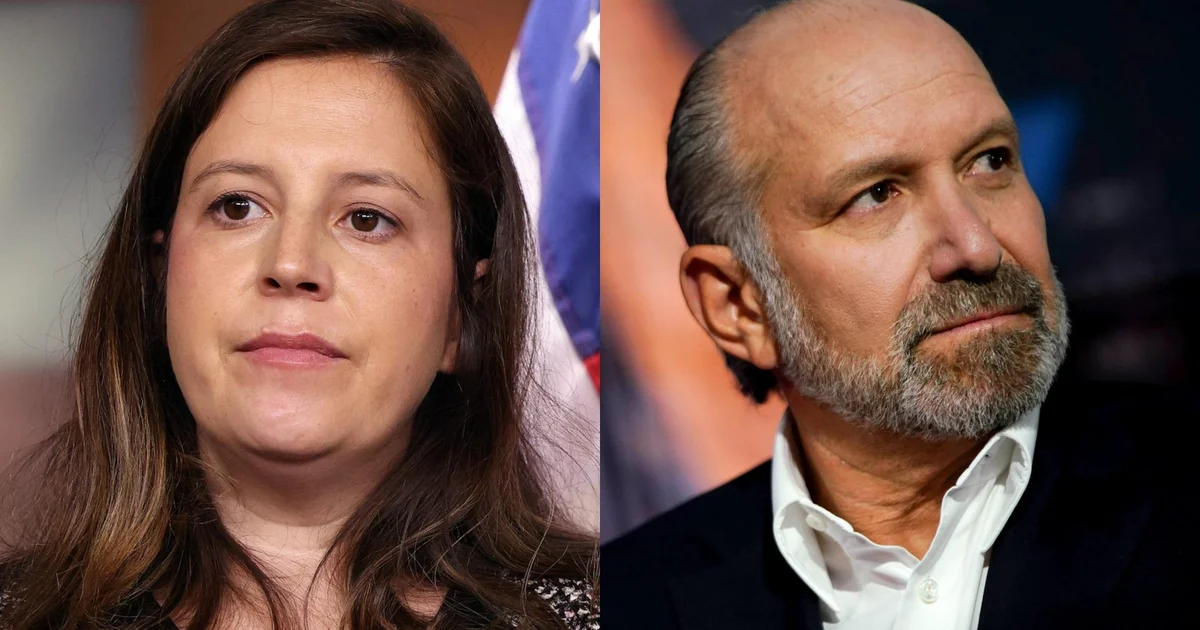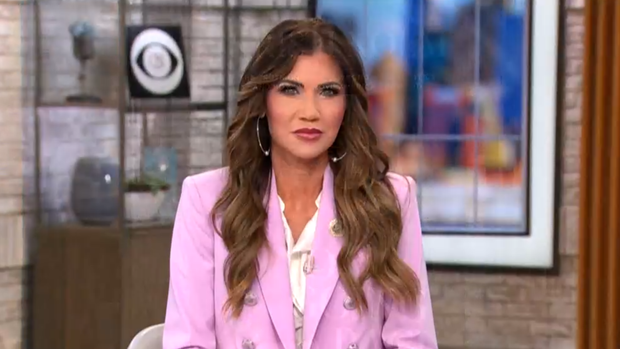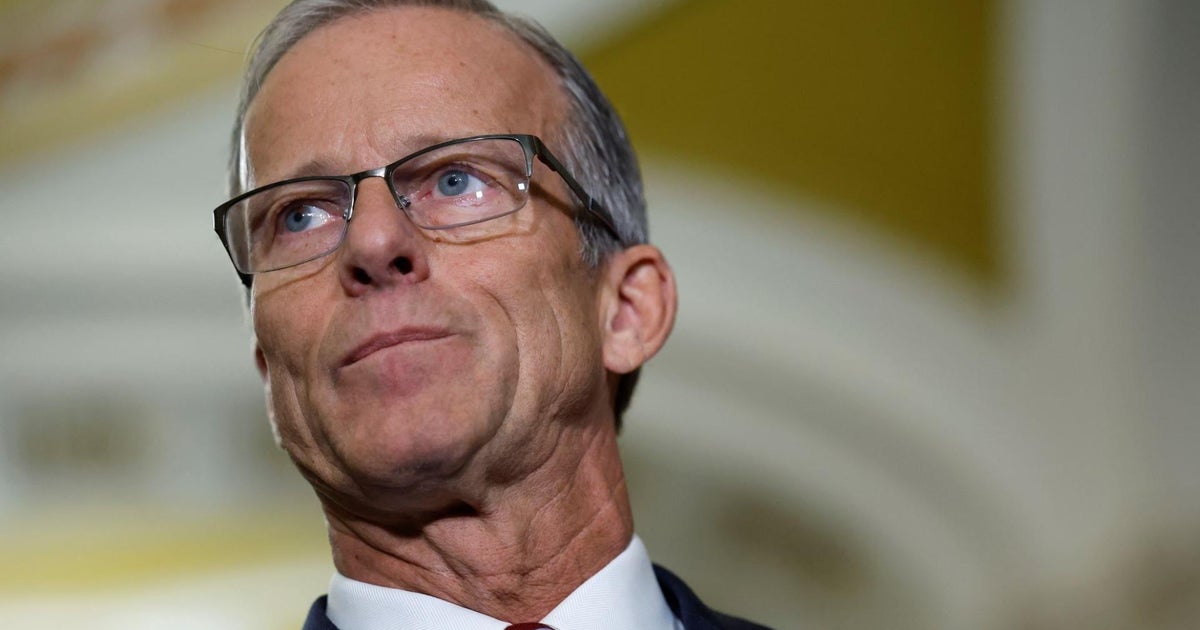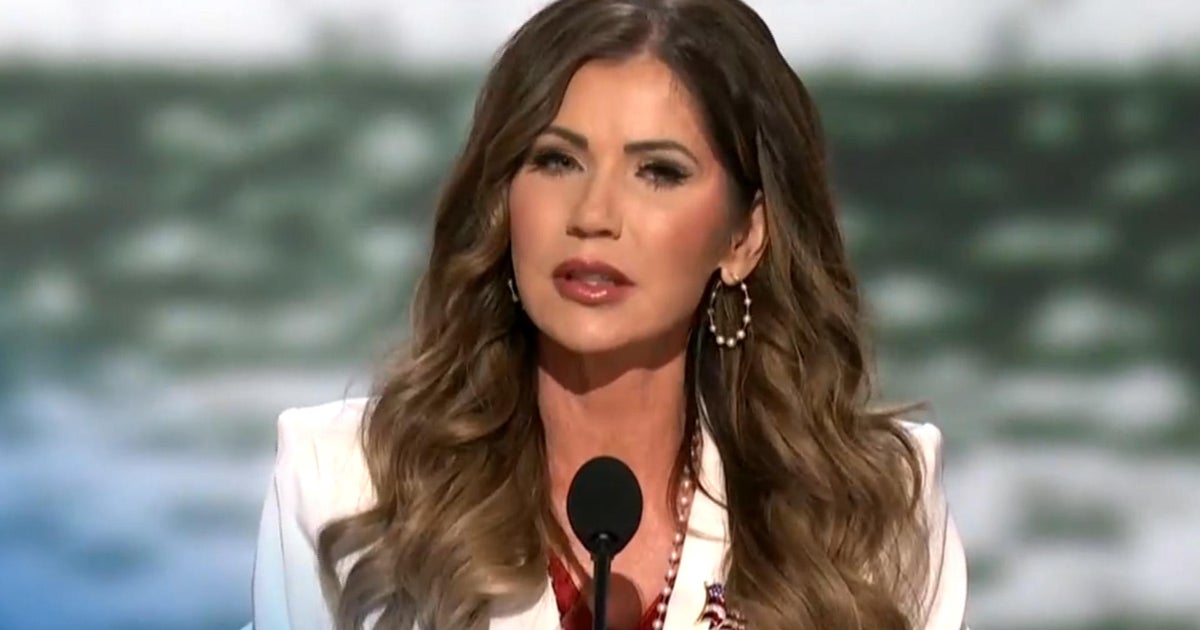CBS News
Gov. Kristi Noem banished by 2 more South Dakota tribes, now banned from nearly 20% of her state

South Dakota Gov. Kristi Noem is now banned from entering nearly 20% of her state after two more tribes banished her this week over comments she made earlier this year about tribal leaders benefitting from drug cartels.
The latest developments in the ongoing tribal dispute come on the heels of the backlash Noem faced for writing about killing a hunting dog that misbehaved in her latest book. It is not clear how these controversies will affect her chances to become Donald Trump’s running mate because it is hard to predict what the former president will do.
The Yankton Sioux Tribe voted Friday to ban Noem from their land in southeastern South Dakota just a few days after the Sisseton-Wahpeton Ovate tribe took the same action. The Oglala, Rosebud, Cheyenne River and Standing Rock Sioux tribes had already taken action to keep her off their reservations. Three other tribes haven’t yet banned her.
Noem reinforced the divisions between the tribes and the rest of the state in March when she said publicly that tribal leaders were catering to drug cartels on their reservations while neglecting the needs of children and the poor.
“We’ve got some tribal leaders that I believe are personally benefiting from the cartels being there, and that’s why they attack me every day,” Noem said at a forum. “But I’m going to fight for the people who actually live in those situations, who call me and text me every day and say, ‘Please, dear governor, please come help us in Pine Ridge. We are scared.'”
CBS News
Noem’s spokesman didn’t respond Saturday to email questions about the bans. But previously she has said she believes many people who live on the reservations still support her even though she is clearly not getting along with tribal leaders.
Noem addressed the issue in a post on social media on Thursday along with posting a link to a YouTube channel about law enforcement’s video about drugs on the reservations.
“Tribals leaders should take action to ban the cartels from their lands and accept my offer to help them restore law and order to their communities while protecting their sovereignty,” Noem said. “We can only do this through partnerships because the Biden Administration is failing to do their job.”
The tribes have clashed with Noem in the past, including over the 2016 Dakota Access Pipeline protests at Standing Rock and during the COVID-19 pandemic when they set up coronavirus checkpoints at reservation borders to keep out unnecessary visitors. She was temporarily banned from the Oglala Sioux reservation in 2019 after the protest dispute.
And there is a long history of rocky relations between Native Americans in the state and the government dating back to 1890, when soldiers shot and killed hundreds of Lakota men, women and children at the Wounded Knee massacre as part of a campaign to stop a religious practice known as the Ghost Dance.
Political observer Cal Jillson, who is based at Southern Methodist University in Dallas, said this tribal dispute feels a little different because Noem seems to be “stoking it actively, which suggests that she sees a political benefit.”
“I’m sure that Gov. Noem doesn’t mind a focus on tensions with the Native Americans in South Dakota because if we’re not talking about that, we’re talking about her shooting the dog,” Jillson said.
Noem appears to be getting tired of answering questions about her decision to kill Cricket after the dog attacked a family’s chickens during a stop on the way home from a hunting trip and then tried to bite the governor. On “Face the Nation,” she was asked about a passage in her book about President Biden’s dog, Commander, which had been known for biting people at the White House. In the book, Noem writes that if she got to the White House, she would say, “Commander, say hello to Cricket.”
Noem said the “president should be held accountable” for the dog, and when Brennan asked, “Are you saying he should be shot?” Noem answered again, “That’s what the president should be accountable to.”
Noem also drew criticism for including an anecdote she has since asked her publisher to pull from the book that described “staring down” North Korean leader Kim Jong Un in a private meeting that experts said was implausible. There is no public record of her visiting North Korea or meeting with the reclusive Kim.
“I’ve met with many, many world leaders. I’ve traveled around the world,” she said on “CBS Mornings.” “I should not have put that anecdote in the book.”
After those controversies, she canceled several interviews that were planned as part of the book tour. With all the questions about “No Going Back: The Truth on What’s Wrong with Politics and How We Move America Forward,” no one is even asking anymore about Noem’s decision to appear in an infomercial-style video lavishing praise on a team of cosmetic dentists in Texas who gave her veneers.
Jillson said it all probably hurts her chances with Trump, who has been auditioning a long list of potential vice-president candidates.
“I think that the chaos that Trump revels in is the chaos he creates. Chaos created by somebody else simply detracts attention from himself,” Jillson said.
University of South Dakota political science professor Michael Card said that if it isn’t the vice-president slot, it’s not clear what is in Noem’s political future because she is prevented from running for another term as governor. Noem is in her second term as governor.
She could go after U.S. Senator Mike Rounds’ seat or try to return to the House of Representatives, Card said.
CBS News
Trump team responds to threats targeting Cabinet picks

Watch CBS News
Be the first to know
Get browser notifications for breaking news, live events, and exclusive reporting.
CBS News
FBI investigating threats targeting Trump picks

Watch CBS News
Be the first to know
Get browser notifications for breaking news, live events, and exclusive reporting.
CBS News
Do you need good credit to enroll in a debt forgiveness program?

Getty Images
Managing a growing amount of credit card debt can be a stressful challenge — but it’s one that millions of Americans deal with each day. After all, the cost of essentials has increased drastically over the last few years, and that has forced many people to rely on short-term borrowing options, like credit cards, to help cover their necessary purchases. As a result, the average cardholder owes nearly $8,000 on their credit cards, and with the average card rate sitting at an all-time high of over 23%, it doesn’t take long for what was once a manageable amount of credit card debt to become an overwhelming burden.
When that happens, the idea of debt forgiveness — also known as debt settlement — may offer a glimmer of hope. These programs, which are offered by debt relief companies, can help lower your credit card debt by negotiating with your creditors to settle your debts for less than the full amount owed, providing a way to regain financial stability. And, in many cases, pursuing this type of debt relief can result in paying 30% to 50% less than what you currently owe, which means you could get substantial relief from your high-rate debts by taking this route.
But if you’ve been considering a debt forgiveness program, you might be under the assumption that, like traditional loans and credit products, these programs require a good credit score for enrollment. But do you really need good credit to take advantage of what debt forgiveness can offer? Below, we’ll explain what borrowers need to know.
Compare the debt relief options available to you here.
Do you need good credit to enroll in a debt forgiveness program?
There are certain eligibility criteria that you must meet to take advantage of this type of debt relief, but in general, no — your credit score does not determine your eligibility for debt forgiveness programs. In fact, many participants in these programs are already struggling with poor credit due to missed payments, high debt utilization or accounts in collections. Debt settlement companies understand this reality and are structured to assist those who are in financial distress.
What matters more than your credit score is whether you meet the other specific requirements for enrollment. Most debt settlement programs require participants to have a minimum amount of unsecured debt, such as credit card debt, medical bills or personal loans. This threshold often starts at about $7,500, although it can vary by debt relief provider. You must also be able to demonstrate genuine financial hardship, meaning you’re unable to meet your current debt obligations. This could stem from a loss of income, unexpected expenses or other financial setbacks.
Not all debts qualify for settlement, either. Secured debts, such as mortgages or car loans, are typically excluded from these programs — so if you’re trying to enroll with mostly secured debts, you may not qualify. Participants must also be prepared to make consistent monthly payments into a dedicated account that will be used to negotiate settlements with creditors. So while a good credit score isn’t necessary, a willingness to commit to the process is essential.
Learn more about debt forgiveness and your other debt relief options today.
How will debt forgiveness impact my credit score?
While a good credit score isn’t required as part of debt forgiveness, participating in a debt forgiveness program can have a significant impact on your credit score, so it’s important to weigh this consequence carefully. Enrolling in such a program may cause your credit score to drop initially. This happens because most debt settlement strategies involve stopping payments to creditors while the negotiations take place. As missed payments accumulate, your credit report will reflect delinquencies, which can lower your score.
When a settlement is reached, your creditor will typically report the debt as “settled” rather than “paid in full.” While this is better than leaving the debt unpaid, it’s still considered a negative mark on your credit report. Settled accounts can remain on your credit history for up to seven years, signaling to future lenders that you did not fulfill the original terms of your debt.
Despite these initial setbacks, debt settlement can pave the way for long-term financial recovery. Successfully resolving your debts reduces your overall debt burden, which can improve your debt-to-income ratio. Over time, as you rebuild positive credit habits, such as making on-time payments and keeping credit utilization low, your credit score can recover and even improve. The key, however, is to approach debt settlement as part of a larger financial strategy, not a quick fix.
The bottom line
While you don’t need good credit to enroll in a debt forgiveness program, you do need to understand the trade-offs. These programs are tools to help you regain control of your finances, but they come with short-term credit implications. If your primary goal is to resolve overwhelming debt and you’re willing to accept a temporary dip in your credit score, debt forgiveness may be worth considering.
Before committing to any program, take time to evaluate your financial situation, explore alternative solutions and consult with a reputable debt relief provider. By doing so, you can make an informed decision that aligns with your long-term financial goals.









